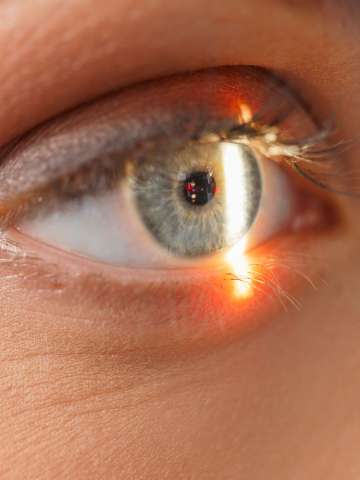Cataract Surgery & Cataract Care
Our specialists are experts in cataract surgery and comprehensive cataract care. We use every available tool and often have first access to new technologies.

Why choose UCLA Health for Cataract Surgery & Cataract Treatment?
Our specialists offer expert treatment for patients needing cataract surgery and personalized cataract care. They use the most advanced, up-to-date technology while keeping out-of-pocket cataract surgery costs well below the national average. Our team is part of the UCLA Health Stein Eye Institute and Doheny Eye Centers, which U.S. News & World Report consistently ranks among the best in the nation for ophthalmology care.
Highlights of our program include:
Physician expertise: Our physicians are known throughout the country for handling complex cases, such as those involving lens trauma, smaller corneas, scarred corneas and more. As a national referral center for complex cataract treatment, we have the expertise to treat a wide range of concerns.
Research and clinical trials: Eligible patients may have access to new treatment options. We’ve participated in numerous pivotal clinical trials, including the one that produced the most popular toric intraocular lens worldwide and another that produced the first capsule tension ring in the U.S.
Access to the latest technologies: We often use the newest technologies months ahead of other practices because of our physician expertise and research involvement. Our eye surgeons offer multiple lens implants and device options to optimize surgery results.
Training and teaching: We offer both a traditional and international fellowship. Because of their teaching role, our physicians continually learn about and implement the newest and most effective treatments. We are a destination center for training world leaders in ophthalmology.
Continuity of care: When you come to our centers, the physician you receive your preoperative care from is the one who will perform your surgery. We use awake surgery techniques so that you always know what’s going on during treatment.
What Are Cataracts: Understanding Cataract Symptoms & Cataract Treatment?
Cataracts occur when the typically clear crystalline lens of the eye becomes cloudy. As a result, you develop blurred vision. It may seem like you’re looking through a foggy windshield.
For most people, cataracts develop as a natural part of the aging process. But you may be more likely to get cataracts if you:
- Have certain medical conditions, such as diabetes
- Have a family history of early cataract development
- Smoke
- Spend a significant amount of time in the sun, especially without sunglasses
- Use certain medicines such as corticosteroids
Cataract Tests, Cataract Treatment & Advanced Diagnostic Care
Our specialists provide a range of advanced testing and treatment options for cataracts. We are known throughout the country for our expertise in cataract diagnosis and treatment.
Cataract tests and diagnosis
Our cataract specialists use several tests to diagnose cataracts and guide personalized cataract treatment plans, including:
Corneal topography: This tool creates a 3D map of the cornea, the clear outer layer of the eye. It helps physicians evaluate the shape and strength of the cornea.
Corneal tomography: The physician takes pictures of both the front portion (anterior) and back portion (posterior) of the cornea to create cross-sectional, 3D images. The images are used to evaluate cornea shape, thickness and function.
Macula optical coherence tomography (OCT) imaging: OCT imaging uses powerful light beams to create images of the retina and optic nerve. Macular OCT imaging combines OCT with assessments of eye symmetry and thickness of the macula, the portion of the retina responsible for central vision.
Cataract surgeries and treatments
Cataract treatment typically involves surgery to remove and replace the cloudy lens with an artificial one (intraocular lens). Cataract treatment may include:
Toric lens implants: These intraocular lenses (IOLs) are the most common option for eyes with moderate to high astigmatism. Once a toric lens has been implanted, it corrects irregular eye curvature (astigmatism).
Multifocal lens implants: These IOLs correct distance and near vision simultaneously so patients don’t have to depend on glasses as often as before surgery.
Femtosecond laser-assisted surgery: We often perform cataract surgery with the assistance of a bladeless laser. This laser improves accuracy without using a traditional scalpel or incisions. Femtosecond laser surgery leads to exceptional results with more precise incisions.
Intraoperative refractive guidance: This term refers to all the technologies we use to refine the selection of a lens implant before inserting it into the eye. We also use these techniques to confirm placement of a toric lens.
Postoperative refractive enhancement: If patients have continued vision problems after cataract surgery, we offer additional surgical treatment to improve uncorrected vision.
Your treatment may also include managing astigmatism, an imperfect eye curvature that leads to blurred vision. Our specialists use techniques that reduce the chances of forming astigmatism after cataract surgery. Some patients may also undergo refractive surgery to correct astigmatism at the same time as cataract surgery and support optimal cataract treatment outcomes.
Meet our team
Our cataract surgeons provide comprehensive cataract care. We offer all available intraocular lens options so that patients benefit from the treatment that best meets their needs. As national leaders in our field, our experts actively participate in clinical trials for new techniques and devices.
Cataract Surgery
Optometry
Contact us
Call our patient communication center at 310-825-2631 for general information about cataract surgery at UCLA Health.
Provider Information and Referral
Dr. Miller, Dr. Hong, Dr. Sam: 310-206-9951
Dr. Bartlett, Dr. Landig, Dr. Chan: 310-983-3865
Dr. Nejad, Dr. Antonucci, Dr. Hwang: 310-267-5577
Dr. Lin, Dr. Kanamoto, Dr. Khorrami, Dr. Kordnaj, Dr. Sahnazi: 310-206-7955
Dr. Malyugin: 310-206-7202
















